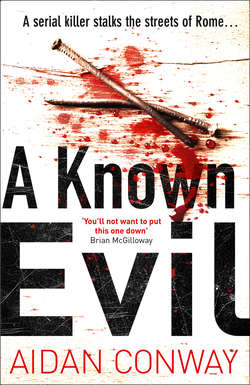Читать книгу A Known Evil: A gripping debut serial killer thriller full of twists you won’t see coming - Aidan Conway - Страница 21
Fifteen
ОглавлениеOne more stroke with the whetstone and the blade was gleaming, sharp as a razor’s edge. He held it up and admired its glint in the street light filtering through the window into the rented apartment. He often sat in the dark at this time of the evening, looking down, watching, while safe in the knowledge he could not be seen. It had always been a favourite game – being the voyeur, the watcher. They, meanwhile, walked along the street, oblivious, as he imagined which of them might put up a fight, who would crumple into so much dust under the blows. Sometimes all it took was a single swing. Other times they had to be pummelled. That was messy. But he liked it like that too, if there was time, and time was of the essence.
He thrust the knife deep into the chopping board at the centre of the table, spearing the official communication that lay there, the three letters that spelled out his now particular form of mortality. The knife was for show, for fear, not for killing. Not yet. He took up the gun then, removed the magazine, and jerked the slide, ejecting the compact round from the chamber. Then he wiped the hammer; not to clean it, but ritually, as if he were a mother drying a small child, dabbing and caressing it before lapping it in its sacking. What did mother say? A good workman cleans his tools. A bad workman blames his tools. So, he was doing well. The holy trinity of hammer, blade, and bullet. And yes, the plan was established, the traps were being set, and the chase was on. But there were so many clues to reveal and so many more had to die before he could have his finale. These had been but the opening lines in the first scene of the first act of the tragedy. Or was it a comedy? Tragedy. Comedy. Tragedy. Comedy. He thought it was both. He really couldn’t quite decide.
It certainly made him laugh out loud to see how the hoi polloi now were running scared. The bars, too, were suddenly so much emptier once darkness fell, the proprietors fretting over lost revenues, cursing the killer who had made their neighbourhood a no-go-zone. Then there were the furtive looks on the frightened faces when a foreign workman threw down his bag and hefted out a hammer as he set to mending the city’s roads and broken paving stones. He knew what they were thinking now. Was one of them the Luzi killer or the Marini killer? Did he pick them up in his van, violate them, smash their skulls then dump the bodies?
He had heard the talk himself, irony of ironies, as he sipped his morning coffee and pretended to pore over the latest local gossip in the Roman Post. Perhaps he would start killing some of them too – the stranieri, the foreigners clogging up the country like the saturated fat in a sick man’s veins. Perhaps he would start slaughtering the fat men themselves, the ones he watched askance as they suckled like oversized infants at the dry, consoling teat of the sports pages in these self-same bars. Or maybe the pensioners and half cripples who fed their fistfuls of small change into the fruit machines from dawn until dusk in hopes of sudden ecstasy.
The letter stared back at him, pierced by the upright blade – night’s sundial casting its dead meridian. It complicated things? Or made everything much simpler? An existential question then – which was his stock in trade. To be or not to be. Life and death. Smell the flowers? Crush them while you can. But he would lead them a merry dance and oh how he would laugh. Laugh at them all. Them all.
